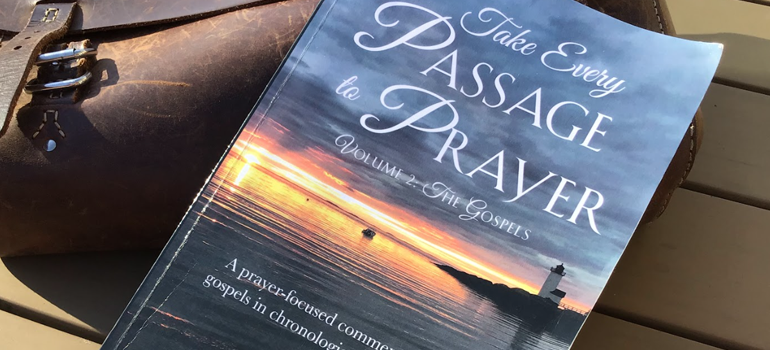The Gramazin Blog

The Woman in Nain Washes Jesusí Feet
Take Every Passage to Prayer - Volume 2, The Gospels
Friday July 05, 2024
Luke 7:36-50
Father, even as I write this, I still favor the likes of characters like “Josey Wales” in the 1976 Clint Eastwood movie. Josey has no emotion, he needs no one, and he is self-reliant to the core.† It is what a “man should be like” according to the characterization of John Wayne. However, there is something appealing about this woman kissing Jesus’ feet and washing them with her hair. I can feel her deep love for Jesus grabbing me through the pages of Your Word. Yes, I’d rather be like this woman than like Josey Wales. I want to have so much love for Jesus, so much appreciation for what He has done for me, that I too would kiss His feet while I shed tears of joy for what He has done for me. Father, help me to love Jesus like this woman does and not attempt to live the maverick life of a loner who foolishly believes he doesn’t need You. Amen.
Father, a man named Simon, one of the Pharisees, whom Jesus had just labeled as immature children, invited Jesus to have dinner with him, and other guests, at his home in Nain. While this invitation may seem like a gesture of friendship, it was nothing of the sort. I learn the following things about Simon in this passage:
- He was judgmental and self-righteous, who considered himself superior to “sinners”.
- He doubts Jesus is a prophet and reveals this doubt through sarcasm.
- He did not wash Jesus’ feet, kiss Him, or pour oil on His head.
Therefore, I can conclude that Simon had nothing but disdain for Jesus, not wanting to show him any courtesy or kindness.
Father, I am also introduced in this passage to a woman who had lived a sinful (?????????, wicked) life. It doesn’t take the imagination long to surmise that she was sexually promiscuous, perhaps well known as a prostitute in Nain. She may have led men, such as Simon, to commit adultery (Proverbs 2:16-19). However, it is clear from the text that this woman regrets her sinful past. She has become ashamed of how she had lived her life. Her heart longs for forgiveness and healing for her soul. It is with this kind of heart that she came to the home to express her thanksgiving to Jesus for the forgiveness of her sin. She arrives while Jesus, the Pharisee, and his guests are eating their meal at the table. She brought with her an alabaster jar of oil.
The woman approached Jesus and began to kiss and wash His feet with the oil by using her hair. She does this with passion and intensity, shedding her tears while doing so. This is clearly a heart that deeply loves what Jesus means to her.
It was at this point that Simon sarcastically thought:
“If Jesus were so smart, He would know this woman is a tramp.”
Jesus knew what He was thinking and told Simon He had something to say to him. Simon’s response, “tell me, teacher (NIV)”, reeks of sarcasm and antagonism.
Jesus asked Simon a question: if someone owed 500 denarii and another owed 50 denarii , and both men had their debt forgiven, which of the two will be most grateful for the forgiveness of their debt? Simon said the man who owed more. Jesus said his answer was correct.
Jesus then looked at the woman and compared her heart to Simon’s.
“Simon, do you know why she is so grateful and thankful for Me? It is because her wickedness was so much greater than yours, but her many sins have been forgiven. She has done all of these wonderful loving things here in appreciation for all of the mercy she has received that covers her sin. You, on the other hand, are not appreciative or grateful for the mercy offered to you because you mistakenly think you are superior to others.” (Paraphrased)
Jesus told the woman her sins were forgiven because her faith has saved her. She could depart in eternal and everlasting peace for her soul. The other doubting guests marveled that any mere man would dare to say someone’s sins are forgiven.
Scripture does not provide any additional information about what happened subsequently to Simon, his guests, or the woman with the alabaster jar. Amen.
People didn’t have cars or bicycles back then. They traveled long distances over dusty roads by walking in their sandals. Therefore, it was a common practice for the dirty and tired feet of guests to be washed by the servants of the homeowner upon their arrival. Walking long distances in the hot sun also caused skin conditions. Oil was applied to renew and restore the skin. The kissing of feet was a sign of submission and reverence in this culture.
There are a variety of reasons Simon may have invited Jesus for dinner. 1) To prove to Jesus that he did not deserve the childish label Jesus had just given the Pharisees. 2) To humiliate Jesus by catching Jesus in an inconsistency in His beliefs during their conversation around the table. 3) To trap Jesus in an offense that could be reported to the authorities. It is clear that Simon was not interested in the message of the gospel.
Consider the possibility that Simon knew this woman so well because he had himself indulged in adultery with her. She may have come to Jesus at this home because she knew where this home was from previous “business.”
She is already a believer in Jesus upon her arrival at this home. Perhaps she came to faith after witnessing miracles that Jesus had performed. Perhaps she had come to faith through His preaching or the preaching of John the Baptist. She doesn’t ask for forgiveness or for a miracle to be performed. She merely wants to express her deep appreciation for what Jesus has done for her soul.
Alabaster is a soft mineral or rock that was used for carving. It was the mineral of choice in the manufacturing of idols. It can be presumed that the jar the woman brought with her had been elaborately carved and was decorative. She brought her best jar to anoint the feet of Jesus.
This is not the same woman who poured oil on Jesus’ head in Bethany at Simon the Leper’s home as described in Mark 14:3. This anointing is clearly early in Jesus’ ministry, in Galilee, while the second anointing is later in Jesus’ ministry, in Bethany in Judea, just before Jesus was crucified. In the Mark account, the disciples were upset that the oil was wasted and not sold for the benefit of the poor. The disciples are not in this account at all in Luke. It is possible, though less believable, that this same woman did the same thing in two different locations, a year or two apart. It is also possible, and a bit more believable, that the second woman in Bethany had heard of the first woman in Nain washing Jesus feet with her hair and she got the same idea.
A denarius is worth approximately a day’s wage. Let’s put this into context for the 21st century. As of this writing, the minimum wage is $ 7.25 per hour. A worker paid at that rate would earn $ 58 for an eight-hour day. The first person owed an amount equivalent to 500 days of wages, or $ 29,000. The second person owed an amount equivalent to 50 days of wages, or $ 2,900.







